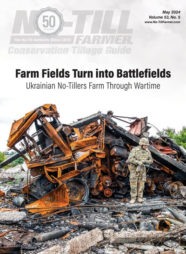There have been more reports of unsuccessful burndown of cover crop and volunteer wheat this spring. Indeed, in our research here we have had some very poor control with glyphosate and glyphosate tankmixes on wheat.
Moreover, even Gramoxone has shown some problems controlling wheat. We had some issues last year with wheat being hard to control prior to planting but have had many more this year. I can only speculate as to the reason but the very cold temperatures probably have played a role in the poor wheat control. Moreover, glyphosate almost always goes out with dicamba and dicamba will cause some antagonism on glyphosate grass control. This can be somewhat overcome with a higher glyphosate rate but not so much under cold conditions.
The problem is once wheat has struggled through that first burndown if becomes even more difficult to control with follow up applications. This is particularly true if glyphosate is the follow up treatment as the sick wheat does not translocate the glyphosate well. Contact herbicides like Gramoxone or atrazine and crop oil in corn have been the better choices for followup burndown treatments of wheat in our research this spring.
There have been a number of reports of horseweed not being controlled with tankmixes of glyphosate and atrazine. This is surprising to me but the results are what they are. It could be that the surfactant in the glyphosate was insufficient to get the atrazine into the horseweed during the cold conditions. A quart of crop oil added to the glyphosate and atrazine may have improved the horseweed control. In crop Halex GT tankmixed with atrazine or dicamba has performed very well controlling horseweed in our research. I would assume Capreno would perform as well as Halex GT but I do not have the experience with it on horseweed.






Post a comment
Report Abusive Comment